#the ballad of songbirds and snakes meta
Explore tagged Tumblr posts
Text
tigris hating the new snow (colour symbolism + minor meta from this scene)
i'm so deeply obsessed with so many of the colour choices in tbosas movie.... like wow! one day i'll talk more about them, but one i want to pull out and talk about right now is tigris' colour scheme in her last scene. the one where she's wearing this:
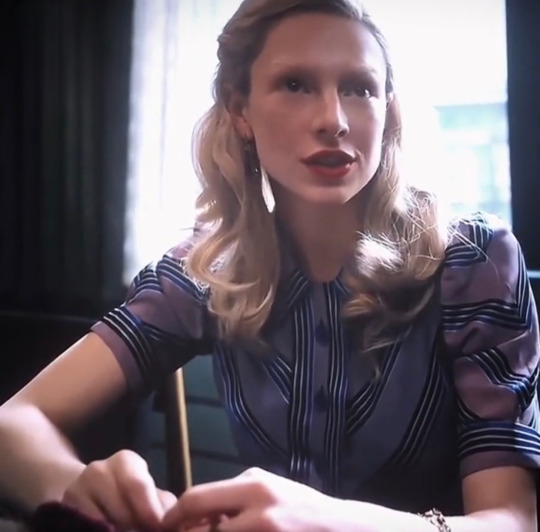
(the picture is not great quality, i'll update this when i have a pic that's more than 2 pixel lol, but it shows what we need to see)
she's got on a light purple/lavender dress with dark blue stripes. blue and purple are usually associated with wealth and royalty (given the historic complications that came with producing them).
purple is especially representative of royalty and wealth, and tigris' outfit is mostly purple, symbolizing the new (wealthy) life that she's found herself in.
blue, along with it's other meanings is associated with melancholy. we know that tigris is unhappy/heartbroken/disappointed with snow's changes, so this link makes sense. it is also a passive colour, showing us that she is passive in coryo's transformation into snow -- there's not much that she can do about it anyway, but i digress. the deepness of the blue implies something tumultous, which gives us an insight into what she's likely feeling: relief at being out of poverty, happiness for coryo's success, but a deep sense of uncertainty and unease at this new snow persona that he's adopted. finally, it can also a colour of peace, which i take to mean that she's sort of made peace with what she cannot change about him, regardless of how she may feel about it.
now we get to the standout of this outfit: the red lip!
usually we see tigris is lip colours that are complimentary to the other colours she has on from what i recall; when she wears pink, her lips are pink, when she's got on dark magentas her lip colour matches/compliments it. the red lip here is clearly an intentional choice as it is a contrasting colour that stands out brightly against the mostly subdued/cool-toned rest of the outfit.
red can be recognized as the colour of passion and anger. the fact that it is on her mouth is certainly trying to show us something. what she says to snow here is "you look just like your father, coriolanus". it is clearly a dig, clearly meant with negative intent, with anger. she is heated! this is the little boy she grew up with, that she protected, that she loved and he's morphing into something sinister before her very eyes. if it wasn't clear by what she said, the subtext behind it, and the way that she said it, the red lip indicates her anger here.
it stands out as a little piece of rebellion against just accepting snow the way he is. she is clothed in colours that show her wealth and complacency with the changes that caused them, but she isn't entirely willing to let it go all the way.
also, she wears warmer colours for a lot of the movie -- pinks and the like -- and now she's in more cool tones, which is an obvious choice being made. she loves coryo (perhaps not snow so much), and she is letting herself be swallowed up by this new life (symbolized by the royal colours and new wealth), but she has that little bit of her that is clinging to the past, that wants her coryo back.
her (minor) dissent against snow is verbal, it is subtle and not exactly obvious to anyone except her and him, in the same way that the red lip is a subtle way of emphasizing her displeasure with this new snow.
she chooses her words very carefully, tailoring them to be a direct referral to her convo with coryo after the arena ("i know you wanna be like your father, but, what i remember the most about him, was that in his eyes it was just hate. you don’t have to pay the same price just to survive. people can be good. you can be good"). snow is like his father, who tigris remembers most as having hate in his eyes. coryo didn't have to pay the same price just to survive, he could be good, but he paid that price anyway.
in the full quote from her last scene, tigris says "i think you look just like your father, coriolanus." This stuck out to me because I don't really remember her ever calling him by his full name often (maybe just at the start when we get the "future president of panem" thing). it seems like perhaps he insisted on; he's not coryo anymore, he's coriolanus snow -- no, he's snow; it could also be something tigris did intentionally. either way, it shows that he is not her precious, still-able-to-be-good coryo anymore.
another interesting thing from this scene is her positioning. she does not rise for him, instead remains sitting at her sewing machine (someone look back and see if its a new machine or if she's using the same one as before!!). she does not rise to greet him happily like the Grandma'am, she remains seated, clearly showing her displeasure at the new snow. plus, usually rising when someone enters a room shows respect; tigris does not rise, ergo she does not respect him!
this also makes me believe that she is not making his clothes anymore (she's at the sewing machine, clearly she can make the clothes, but he grabs the coat out of the closet, showing that it's not a tigris snow original creation). it's a contrast to how we first see adult tigris, rushing up to coryo with a shirt she made/modified. now she keeps her distance and doesn't give him clothes. this shows that huge huge huge pit growing between them. once again, this is not her coryo anymore.
i'd assume that she initially was offering to make/alter his clothes, but somewhere along the way he refused. it's a sign of the hard times when all he had to wear was too-small shoes and potato-starched shirts sneaked in with curtains to be bleached. buying new clothes shows power and wealth and coriolanus' 'impeccable, well-bred, respectable taste' that comes from being a snow.
regardless of the how, she's not doing his clothes anymore, she's displeased over the new snow, he's not her baby coryo anymore, and the distance between them has never been bigger, not even when he was all the way in 12.
#the ballad of songbirds and snakes#the ballad of songbirds and snakes meta#tbosas#tbosas meta#coriolanus snow#tigris snow#tigris snow meta#coriolanus snow meta#panem#panem fashion#the capitol#president snow#coryo#snow lands on top#suzanne collins#thg meta#thg#mine
116 notes
·
View notes
Text
Katniss is like Lucy Gray this, Katniss is like Sejanus that, and yes fine that's all good and true and lovely but Katniss Everdeen is also a direct parallel to Coriolanus Snow and people NEED to start talking about this because it's driving me crazy.
Think about it: they both grew up poor and deeply vulnerable, losing parents at a very young age, with a matriarchal adult (Katniss' mother and Coriolanus' Grandma'am) who fails to provide for them emotionally and physically. They intimately understand the threat of starvation, even developing with stunted growth because of it, and their narrations in the books share a fixation on food. Throughout their childhoods, both experienced constant fear and suffered a fundamental lack of control over their circumstances. Because of this, they're inherently suspicious of the people around them. They resent feeling indebted to others, especially those who have saved their lives. They're motivated almost entirely by family and deeply connected to their communities. Both are used and manipulated by the Capitol, both are forced to perform to survive and despise every inch of it, both are thrown into the Arena and made to kill. Both have a self-sacrificial, genuinely sweet sister figure acting as their conscience. Peeta and Lucy Gray - performers and love interests with a fundamental kindness and sense of hope about them - fulfill markedly similar roles in their narrative. Both contribute to the development of the future Hunger Games, Snow throughout tbosas and Katniss towards the end of Mockingjay.
It's easy to ignore these similarities because, as mirrors of each other, they are exact opposites. Katniss is from District 12, viewed and treated as less than human; Snow is the cream of the Capitol crop, given the privilege of a name with social weight, an ancestral home, and the opportunity of the Academy despite having no more money than a miner from 12. Katniss has no agency over her life, and responds by being kind whenever she's able, while Snow justifies horrendous evils in order to continue his quest for complete control. Katniss does everything she can to protect her family; Snow does everything he can to protect his family's image as an extension of his own ego. Katniss loves her District and connects with its inhabitants on a meaningful level, but Snow is indifferent at best to his peers - the apparent "superior people" - and only engages with his community for personal gain. Katniss emerges from the Arena horrified at herself and the system, but Snow takes his trauma and turns it into an excuse to perpetuate the violence with himself at the top. Katniss cares for Prim until her death and then snaps at the loss of her little sister, while Snow survives on Tigris' blood, sweat, and tears and then torments and abandons her, presumably because she calls him out on his insanity. Snow actively adds to and popularizes the Hunger Games because of his vendetta against the Districts following his childhood wartime trauma - Katniss briefly agrees to a new Hunger Games in the pursuit of vengeance, but later stops them from happening by killing Coin and choosing a life of peace and privacy. Snow is obsessed with revenge, but Katniss empathizes with the Capitolites and does what she can to keep them from suffering. He exists in a cruel system and selfishly upholds it; she exists in a cruel system and works to dismantle it for the good of her family and community, at great personal cost. And Peeta and Lucy Gray are incredibly similar, but Katniss and Peeta forge a relationship of genuine love and understanding that shines in comparison to Coriolanus' obsessive projection onto Lucy Gray.
So, yeah, Katniss is Lucy Gray haunting Coriolanus. But I bet you anything that eighty-something year old President Snow looks at her, the girl on fire, bright and young and brilliant, emerging from a childhood of starvation with a relentless hunger for success, a talented and charming performer helping her win the Games, and he sees the ghost of his own past. And that's why he's so afraid of her! Because if he sees himself in her, then he's up against his own cunning, his own talent for manipulation, his own charisma, his own genius. He's up against the version of himself that he once wished to be, with the nightmare army of his childhood at her back and her star-crossed lover at her side, spewing Sejanus' truths in his own voice. This isn't to say that Katniss ever achieved the level of power and agency that Coriolanus did during her time with the rebellion, but it is to say that Snow was taken down by what truly terrified him - his own morality, come to finish the job.
#the ballad of songbirds and snakes#tbosas#katniss everdeen#coriolanus snow#president snow#lucy gray baird#peeta mellark#everlark#tbosas meta#the hunger games#thg#snowbaird
17K notes
·
View notes
Text
i think something that elevates the hunger games franchise is not just the quality of writing but the integrity of it. tbosas isn’t just a cash-grab by suzanne collins in the age of sequels and reboots (though i won’t pretend that didn’t play a part), it’s a character study of the main antagonist with a different structure than the main trilogy. and importantly, it doesn’t just re-hash the same old themes and beats the main trilogy had, it expands on not just the world of the hunger games but the themes as well, it actually has something new to say about the trilogy’s themes about class, capitalism, power, and control, in a way that couldn’t be explored with the main story because the protagonist of that story simply did not have access to the world that’s being explored in tbosas.
i understand the people who call for books/movies to be made about haymitch, finnick, johanna, different years of the games — we love those characters and want to see more of them! i’d kill for a novella on finnick’s days mentoring tributes, or katniss’s parents falling in love. but at the end of the day we probably wouldn’t be very satisfied with those stories being fleshed out if they had absolutely nothing new to say about the world, they’d be enjoyable, but not as interesting and engaging as tbosas has been.
#the hunger games#the ballad of songbirds and snakes#thg#tbosas#lucy gray baird#coriolanus snow#finnick odair#johanna mason#haymitch abernathy#thg series#thg meta#hunger games prequel#been thinking about this since i read tbosas tbh#rachel zegler#tom blyth#josh andres rivera#movie industry
14K notes
·
View notes
Text
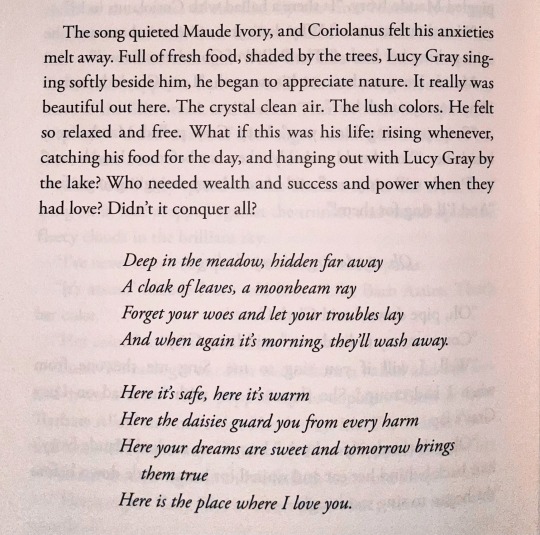
"Who needed wealth and success and power when they had love? Didn't it conquer all?" -Coriolanus Snow
Yup. That's it. That's the end of their story. No need to turn the other pages that's the end of the book. Coriolanus Snow finally learned all the right lessons. They lived happily ever after. (in denial)
After watching this franchise and reading the books- I just love that Katniss and Peeta at the last scene of the series are in the meadow living their lives peacefully, the very SAME meadow where Snow once considered "Didn't Love conquer all?".
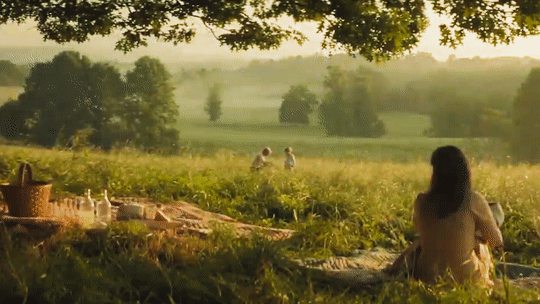
It did.
#the hunger games#Coriolanus Snow#the ballad of songbirds and snakes#Lucy Gray Baird#tbosas#Lucy Gray#thg#Katniss Everdeen#Peeta Mellark#Everlark#Snowbaird#suzanne collins#mockingjay#thg meta
6K notes
·
View notes
Text
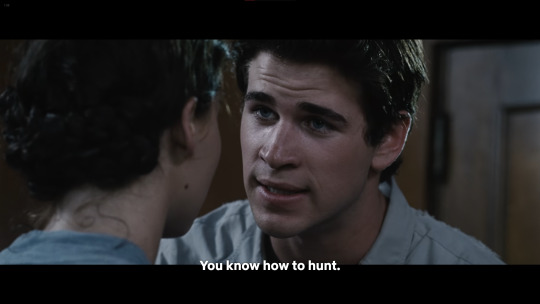
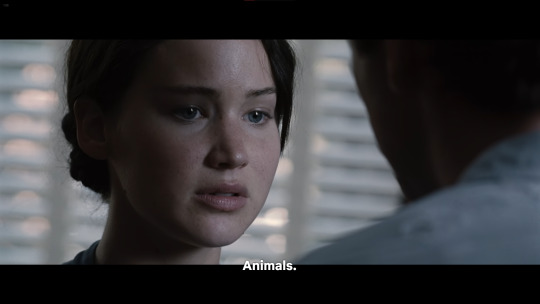
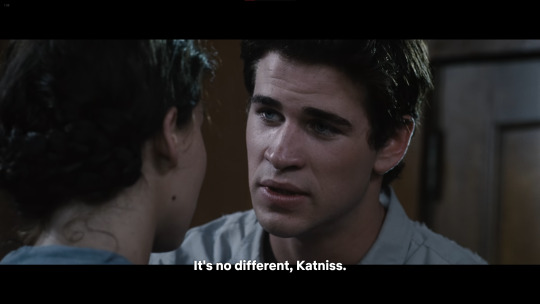
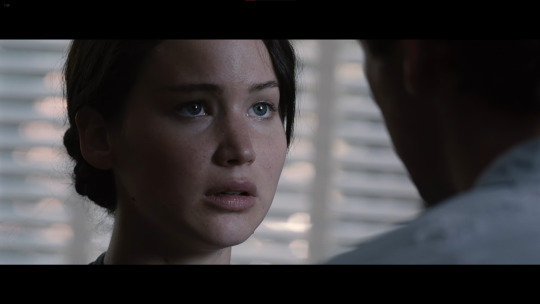
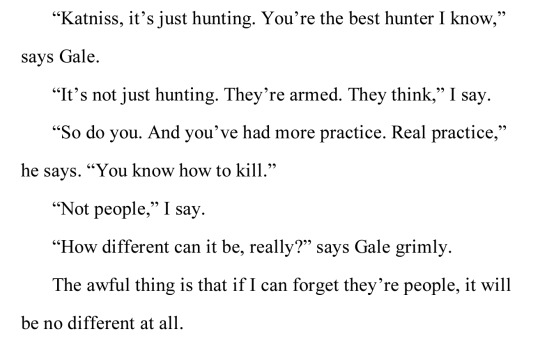
The Hunger Games, 2012 (Gary Ross) and The Hunger Games, 2008 (Suzanne Collins)
It's so interesting that, from the very beginning, Gale is established as someone who has a disregard for human life, and who does not truly view those different from him as "people." We see this here, where he dehumanises the children Katniss will have to fight in the Games. We see this in Gale's vocal resentment of Madge Undersee, in how he despises her for the privilege she was born with and grew up with.
This "us vs. them" infighting and mentality that Gale falls for (a mentality that the Capitol propagates, and that the Games act as a metaphor for) is one that eventually leads him to kill innocent children.
This thinking is also something Katniss must learn to break out of -- when she grapples with killing her opponents in the Games, who are truly just children, or when she realises "who the real enemy is" at the end of Catching Fire.
But Gale is unable to grow past this. He's willing to kill children (!) who are innocents, who haven't committed any crime other than being born in the wrong place at the wrong time -- just like Madge, who Gale despised in Book 1.
And Gale obviously DOES feel bad about "killing" Prim. But what's worse is the thought that, if it wasn't Prim who died, if it was just some random faceless people, would Gale still care?
I think Gale is a really interesting character whose development is so tragic yet still makes so much sense. It's a shame to see people write him off so quickly without seeing the analytical, thematic, and political value that we can gain by exploring his story and ideology.
#the hunger games#hunger games#gale hawthrone#katniss everdeen#peeta mellark#catching fire#haymitch abernathy#mockingjay#thg#thg meta#the hunger games meta#primrose everdeen#interesting#finnick odair#long post#ballad of songbirds and snakes#president snow#lucy gray baird
2K notes
·
View notes
Text
Snow not believing Katniss was in love with Peeta is actually part of his character
Thinking back, Katniss' actions after the first game were as convincing as they can be when you don't see her inner monologue. She was only saying she was acting because she wasn't able to process her own feelings and Haymitch pretty much told her, "You're acting, girl, keep acting if you don't wanna get killed." That again put a strain on her and further complicated her feelings.
But if you think about it, she was banging on the door of the operation room when Peeta was being treated, acting hysterical; she kissed him for 10 minutes straight on stage and she was kind of into it; she was so upset about Peeta losing his leg that she cried on stage and hid her face in his shirt to the point HE had to console her about it; she was pretty much sitting in his lap throughout the whole interview.
That looks like a girl madly in love to me. Like, when did she ever give anyone any hint that it was fake? It was all in her head.
Still, Snow was convinced no one would love another person so much they'd rather die with them. Because he didn't think like that and he can't comprehend why someone would think like that.
I'm also wondering why Snow didn't assume Peeta was lying, too. We as readers know Peeta actually lies more than Katniss does and is good at it. Snow probably thought he was just someone waiting to be saved or something. Everyone underestimates Peeta as per usual. That's a topic for another day.
#the hunger games#hunger games#thg#everlark#peeta mellark#katniss everdeen#coriolanus snow#president snow#the ballad of songbirds and snakes#tbosas#top post#thg meta
7K notes
·
View notes
Text
having serious tbosas brainrot so here's a list of things that were in the books that i wish the movie showed: (spoilers below)
how far tigris was willing to go to protect coriolanus. in the books it implied she was willing to sell her body to keep him fed (also i cant even begin to imagine her reaction to seeing Snow selling desirable victors to captiol citizens when she herself as a child wanted to resort to prostitution to put food on the table FOR HIM.)
how insane dr gaul was in the books. iirc she didnt warn clemensia about the snakes and lied that they were harmless
clemensia being gone for weeks and her parents not questioning it bc gaul said it was a flu + clemensia COMING BACK all covered in scars/scales and no one questioning what happened to her (seriously the grip gaul had within the capital was INSANE)
how awful highbottom and gaul were in the books. i absolutely loathed them when i read tbosas whereas they weren't as bad in the movies (though that might be bc i love viola davis and peter dinklage)
how much coriolanus' mother meant to him (they talked about it a bit in the movie but i wish they showed him smelling her compact when he was upset/stressed)
the extent of how coriolanus manipulated both his classmates AND sejanus' parents
also how sejanus' ma always made sure coriolanus was fed when he went over to the plinth's home and how she sent them sweets and pastries when they were sent to 12
sejanus asking coriolanus to switch tributes with him because he thought coriolanus would be able to get through to marcus/better his odds
coriolanus suggesting they use the mockingjays as target practice
in the books sejanus always calls coriolanus by his given name "coriolanus" and he only calls him coryo after his stint in the arena (to which coryo wanted to strangle him for trying the family nickname at that moment)
(edited for the last three bullet points)
#thg#the hunger games#the ballad of songbirds and snakes#ballad of songbirds and snakes#tbosas#tbosas spoilers#tbosas movie#tbosas meta#sejanus plinth#coriolanus snow#tigris snow#dr gaul#lucy gray baird#clemensia dovecote#casca highbottom#dean highbottom
2K notes
·
View notes
Text
I've seen so many posts about how Coriolanus is cold and calculating and a user first and foremost but like. y'all are forgetting that he genuinely cared about people. He loved his family fiercely, he had a best friend in school (Festus) and even seemed worried about him because of what Nero Price had done during the war to feed his family (the line, "Did you tell your best friend his crush was a cannibal?")
We see other instances of his compassion throughout, too. Even if you discount everything he ever did to protect Lucy Gray, even if you boil his affection for her down to infatuation and obsession, he cared about other people.
he had the capacity for kindness (shown many times with Lysistrata), for guilt (for Clemensia's encounter with the snakes and for how he ignored her after), for genuine sympathy (he nearly cried for Festus when his tribute died and he left the dais), for regret (over turning Sejanus in), for grief (Arachne, the Ring twins, Gaius, Sejanus—to an extent, we even witness the grief he still feels for his mother's death).
The entire book of tbosas is a constant example of his anxiety, as well.
Yes Coriolanus turns out evil in the end, but discounting his capacity for humanity and genuine warmth will only serve to make us forget that his tale is one of choice.
this was not predestined.
he wasn't born a monster; he was molded into something bitter, and tired, and scared, and shaped himself into something monstrous after. his descent was not a steady decline; it was full of moments where he nearly turned himself around! it was his feeling of obligation to his family's legacy that kept him on a dark, easy path.
Lucy Gray believed they were written in the stars, and the book comments that Coriolanus didn't truly believe in mysticism or destiny or anything like that.
Because Coriolanus made every possible choice he could to delay the inevitable: his own disgrace. He valued his image more than his morals, which is what eventually led to his first downfall and eventually his death. remember what Tigris said? about having to choose between those?
Well, Coriolanus did have a tendency toward greed.
#jay jabbers#the hunger games#the ballad of songbirds and snakes#tbosas#coriolanus snow#sejanus plinth#lucy gray baird#snowbaird#snowjanus#meta
589 notes
·
View notes
Text
“he tore down the flag.”
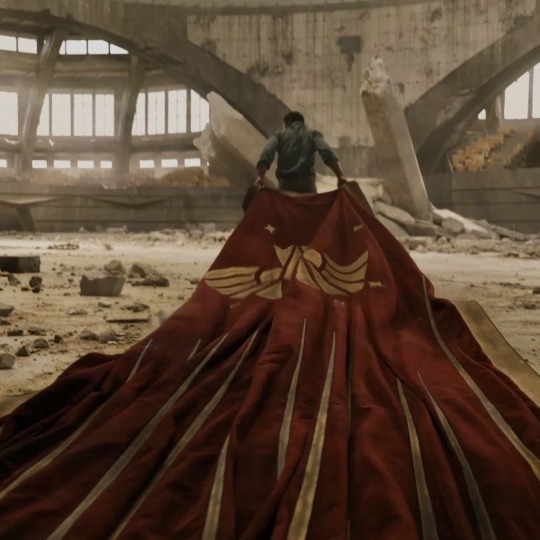
#i have so so many thoughts about reaper and his acts of defiance and kindness#gonna write a whole meta post on it#tbosas#the ballad of songbirds and snakes#tbosas spoilers#reaper ash
526 notes
·
View notes
Text
thinking about those two minuscule moments in the movie when lucy gray leans in for a kiss it's coriolanus that pulls away and when coriolanus leans in for a kiss it's lucy gray that pulls away. like in each other's homes they would never be comfortable with one another, not fully and instinctually their bodies know this. it just takes their minds to catch up
#films#the hunger games#the ballad of songbirds and snakes#snowbaird#coriolanus snow#lucy gray baird#meta#text#tais toi lys#thgpost#i finished the book yesterday and watched the movie today. i will be insufferable . apologies (is not sorry at all)#*
487 notes
·
View notes
Text
I think a lot of people in the fandom don’t give credit to how smart and capable Sejanus actually is.
It gets swept under the rug because a lot of his actions during Parts I and II may seem irrational and impulsive, but that’s only because we’re seeing them through Coriolanus’s eyes, who of course can’t empathize with the misery he’s going through by being forced to participate in the Games (and as a mentor to a former friend, no less); and the way it makes him act that way.
But in Part III? When he’s finally free from the games and the Capitol? He thrives. He instantly becomes friends with his bunkmates, with other peacekeepers, with the Covey. He adjusts to District 12 like he’s always belonged there.
When Coriolanus needed help to find out where Lucy Gray lived, Sejanus is the one that gets the information for him –anticipating Coriolanus himself. Discretely, because he correctly deduces that Coriolanus wouldn’t want other people to know they were looking for her.
It’s also Sejanus the one who gets him to the Covey’s place, taking charge of their trip there, asking around for directions and guiding them through the Seam. We know damn well Coriolanus would’ve never reached the place by himself.
And most impressively, he managed to infiltrate a rebel plot without any of the peacekeepers noticing it. And I’m not counting Coriolanus because the only reason he realized Sejanus was involved in something shady was because he was obsessively watching his every move (and literally went through Sejanus’ stuff behind his back to find some dirt on him). If Coriolanus really didn’t care about Sejanus like he proclaimed to, he would’ve been none the wiser to the rebel plan, just as their other bunkmates and fellow peacekeepers were.
Sejanus knew how to lie, how to play his cards right. Spruce wouldn’t have trusted him with the escape plan if he thought Sejanus was incapable of handling it.
When the murders happen, he doesn’t panic —he’s shocked (understandably so), but he’s able to remain calm.
What I’m getting at is — give my boy his flowers! And recognize that he’s not this helpless, emotional boy who constantly needs saving. That’s what Coriolanus thinks. He was a smart, capable young man who was willing to lie and get his hands dirty for something he believed in. Give him credit where credit is due.
#sejanus plinth#the ballad of songbirds and snakes#ballad of songbirds and snakes#the hunger games#tbosas#tbosas meta#I guess??#*#yall keep falling into Coriolanus’ incorrect assessment of sejanus#it’s driving me crazy
129 notes
·
View notes
Text
In the movie, they added Snow giving Lucy Gray his mother’s scarf/shawl which Lucy Gray even describes as still smelling like roses (which was her signature scent). And when Snow goes into the woods to chase Lucy Gray, he comes across the scarf on the ground which Lucy Gray presumably planted along with a snake. However, in those moments right as we see him descend into madness, he picks up the scarf and smells it. And it is almost as if he is trying to absorb and hold onto as much of his mother as he can—hold onto the goodness—only to realize that the smell of roses no longer remains. No goodness lingers. Thus, marking his complete embrace of the darkness and of his father which is further confirmed when Tigris tells Snow, “you look just like your father” at the end of the film.
And the reason why I love it so much is that it is a callback to a similar moment in the book. In the book Snow undergoes this rebirth and full transformation of sorts when he dives into the lake with the guns to hide the evidence and when he emerges his mother’s rose powder that he had on him is ruined while his father’s compass remains in tact. Once again, this represents how the goodness no longer remains and is destroyed by his actions as he steps across that line into evil. Snow emerges from the water hardened and planted firmly on the path that leads to control and power.
#the hunger games#thg#the ballad of songbirds and snakes#tbosas#ballad of songbirds and snakes#coriolanus snow#president snow#thg meta
449 notes
·
View notes
Text
"If you watch the original films, it's almost as if Donald Sutherland knew his backstory so well, because you can just see that he's so angry that Everlark is what Snowbaird could have been… in Tumblrspeak, to use the ship names. But, in all honesty, it's like seeing what could have been for him."
--Rachel Zegler, red carpet interview with IndieWire
434 notes
·
View notes
Text
In the modern publishing landscape, these days, I think like we do not have many (if any) point-of-view characters with low social motivation for whatever reason.
Sure, there are lots of characters with social anxiety or other perceived or legitimate foibles to overcome, there are many YA villain origin stories, and there are many unpalatable, traditionally "unlikable" men in classics, but disregarding those, who else do we have?
Can the state of openly being alone (and content) rarely be presented as morally-neutral or as the end result of a narrative? Must it always be that either being alone is the starting point, so there's room for "personal growth," or that being alone is seen as "undesirable" and/or an indication that the person alone has a "problem" or something otherwise wrong with them, like a deficit or moral failing that in some kind of karmic way gives them "what they deserve," which is being alone and discontent with it?
Characters with society anxiety, any differences in communication, or other reasons that interfere with forging connections "don't count" because they may still be motivated. Traits such as these only stand in the way of gaining relationships, as plot obstacles. They aren't intrinsically tied to indifference or to low motivation. So, these characters clearly are not experiencing a lack of interest. And they are not the ones rejecting others. Thus, they "don't count" as far as the archetype that I'm looking for goes.
Characters who undergo villain arcs or otherwise negative arcs may want to maintain their relationships or gain them, so some examples are immediately disqualified (hence not having low social motivation), even if they are the type of character most likely to alienate themselves by a story's end, conflicting with what they wanted.
(Unfortunately, Coriolanus Snow, who is quite close to the type of protagonist I'm searching for "doesn't count" because he has some drive to keep people in his life.
Rafal Mistral partially "counts," and is satisfying as a character, but also doesn't count because he temporarily makes "friends" or allies, depending on how you look at his exploits. Yet, despite all this, not having friends isn't exactly framed as a morally-neutral state either, so he is also disqualified by the end. Basically, he does have low social motivation, but his narrative lacks the conditions that would make the natural consequences of that low motivation play out for themselves. He is always surrounded by people, even if he hates every last one of them.
And, generally speaking, the usual, moody-broody, "misunderstood" YA love-interests very easily "don't count" because they have a desire to get closer to their object of affection.
Even Katniss Everdeen, an overall good person, who usually views herself as "unlikable," befriends others, originally for pragmatic, survival purposes. However, she does start with low social motivation, so that's something in her favor.
And yes, I'm aware that we need other people in this world—I would just like to see someone prove that supposed truth wrong once. And perhaps succeed in their world, if that's not too much to ask for.)
Also, are there any instances of characters who progressively alienate themselves from others, in which that progression is not inherently seen as negative? Like, what about non-corrupt misanthropes? Are there few of those in literature? (Maybe—Eleanor Oliphant from literary fiction counts, but something about that book did not appeal me and I didn't finish it.)
Classics guys sort of "count," but I haven't really seen examples of any comparable protagonists today since many authors and readers write and look for "relatability" in blank slate everyman figures oftentimes.
(I'm not done with Crime and Punishment yet, but Raskolnikov is very tentatively looking like a safe bet for a character who may end up alone and who may not be completely malcontent over such a fate, even if I'm expecting tragedy. I'm that not far along, but I also wouldn't mind it too greatly if he died, I suppose.
And even Sherlock Holmes has Watson as his constant, even if he's notoriously asocial! So he "doesn't count" either.
Carol from Main Street also comes close, but still ultimately desires approval from others.
Maybe no one is truly immune to humanity and I should give up on this notion?)
How many pov characters out there are 1) apathetic toward the masses and 2a) either alienate themselves as the plot progresses or 2b) do not make any friends? (I will allow them making friends and consequently losing them though because that still ends in net zero!)
Indeed, this "gap" in protagonists I've been running into lately, especially with coming-of-age arcs and protagonists whose arc is some form of "getting out of their shell," is: why do we (almost?) never see protagonists who just flat-out don't progress in terms of connecting with fellow humans?
Wouldn't having even a handful of those types be reflective of reality? (We as a society are more disconnected than ever, to be fair, despite constantly having access to one another via technology.)
Or I would completely understand it, if it were narratively impractical to have a plot in which a protagonist makes zero friends. Maybe, it's a near-unwritable form for a story?
So, my question is: does anyone have book recommendations, which present a character whose end goal is not to make friends or forge connections (any other ambitions or motivations are fine) and whose state of being friendless both lasts and is regarded as morally-neutral or as not outright evil? Any genre is fine. High fantasy is preferable. I am stumped.
(I also wouldn't mind recommendations of books in which the protagonist is vilified due to being alone, even if that is not my primary query here.)
#bookblr#dark academia#writing#introvert#writeblr#books#booklr#bookworm#hunger games#introversion#bookish#book#writer#writblr#creative writing#tbosas#the ballad of songbirds and snakes#coriolanus snow#the hunger games#book recommendations#books and reading#crime and punishment#raskolnikov#fandom meta#book reccs#fandom#eleanor oliphant is completely fine#school for good and evil#rafal mistral#rise of the school for good and evil
97 notes
·
View notes
Text
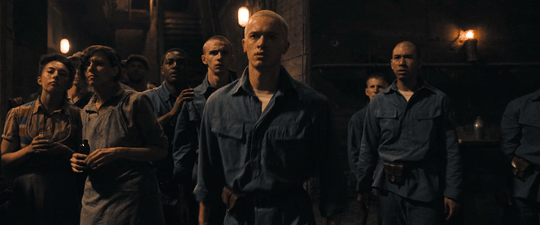
There’s an ongoing joke that this random man punching Snow is Katniss’ grandfather. It’s so hilarious that I choose to believe it is CANON.
It’s true. It’s all connected. 🤓👆
It’s a joke where the punchline is delivered first and Katniss is the one that ends it.
#Katniss Granddad saw the blonde twink and immediately wanted to punch him#he didnt know why he just felt like it as payback for something#some sort of punchline for the future#coriolanus snow#the ballad of songbirds and snakes#the hunger games#katniss#katniss everdeen#maude Ivory#coryo#president snow#tbosas#thg#suzanne collins#thg meta#they’re always gonna be a thorn on his side#tom blyth
687 notes
·
View notes
Text
Ok so I’ve seen a lot of people complaining that they “made Snow hot” in the ballad of songbirds and snakes and I feel like they’re fundamentally missing the point.
Of course Snow is hot, he is (in appearances) rich and popular and charismatic and of course his looks played a significant part in how he was perceived and thus on how he could manipulate others. Of course he has the ability to be likeable, it’s how he charms people how he plays his own version of the games. That’s how he charms the reader.
And!! That’s the nuance! That you can KNOW that this character is irredeemably evil but that you can still catch yourself rooting for him, or smiling at an amusing comment, or hoping that he’ll do the right thing. Suzanne writes about how people who have flaws (Snow, Katniss) can become heroes or villains through their ACTIONS, not an innate sense of good or evil.
Snow’s looks, his charisma, are a key factor in his story and in how he navigates the world. It’s not just a casting choice to try and attract audiences
#the hunger games#the ballad of songbirds and snakes#tbosas#thg meta#thg#tbosbas meta#coriolanus snow
897 notes
·
View notes